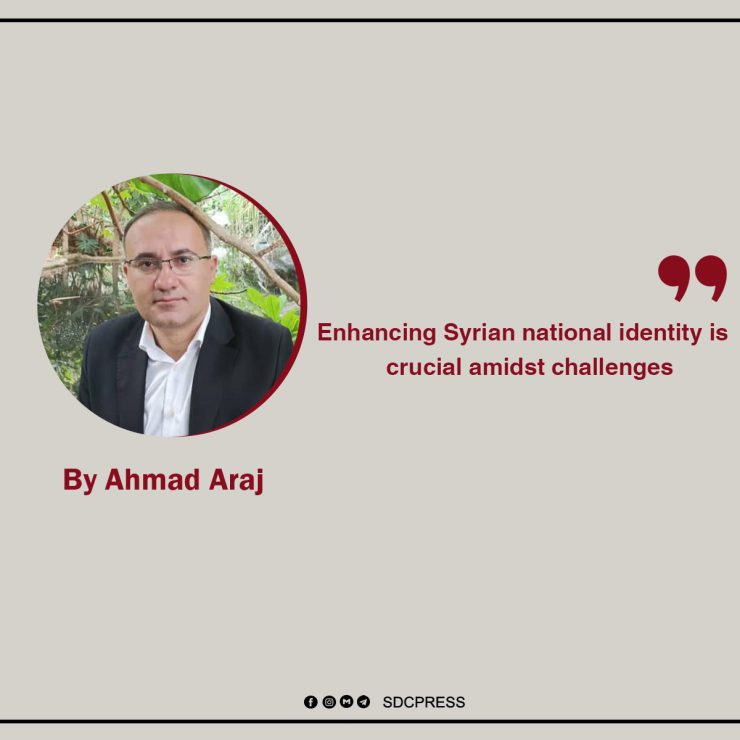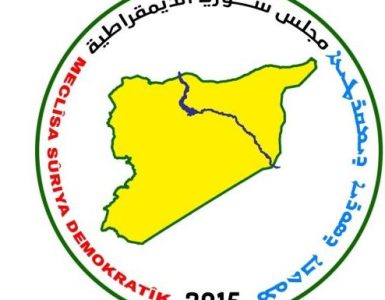By Ahmad Araj
Secretary-General of the Syrian National Democratic Alliance Party
The Syrian national identity is linked to specific factors that enhance its development. However, there are other factors that contribute to its decline in favor of secondary, ethnic, sectarian, and regional identities. Those identities undermine the concept of the Syrian nation and its associated citizenship.
The focus on sectarianism, in particular, represents one of the most negative factors in fragmenting the Syrian fabric and the national identity in favor of regional projects with historical and religious dimensions. This shows the role of occupation powers and external entities in fueling sectarianism and supporting movements adopting national interests for those powers and entities. On the other hand, there is a positive role with a national dimension played by various active national movements and parties. They have worked to unite various identities in Syria against projects of external entities.
Throughout history, the united territories have been one of the essential basics of Syrian identity. Therefore, its significance has persisted. Some of these territories were separated by international powers, particularly through the roles of the French and British governments in shaping the current borders via the Sykes-Picot Agreement. Those two states represented the governing international regime a century ago.
Nowadays, the dangers of shaping borders persist by the international regime that support Turkey’s presence in northern Syrian territories, because Turkey has strong ties to NATO.
Alos: Empowering Syrian women addresses current challenges and shapes the future
At this critical phase, Turkey intensifies its efforts to control all northern Syria. It implements systematic policies, including the establishment of settlements, as part of a comprehensive demographic change strategy in the occupied cities of northern Syria. This echoes events from a century ago in the occupied Iskenderun region. It is obvious that Turkey uses its a deep-rooted experience in genocide, occupation, and displacement. It is essential to unite efforts against these expansionist projects, which are facilitated by external opposition supported by Turkey and its mercenaries. At the current political situation, these projects are justified based on sectarian factors used by Turkey and its mercenaries in regions of Libya, Azerbaijan, Ukraine, Niger, and Mali.
The use of political Islam by Turkey represents an example of external influence in dismantling Syria’s national identity. This is based on sectarian factors, aimed at sowing discord among the components of Syrian society and weakening their cohesion. It also creates a favorable environment for Turkey to execute its expansionist projects in the region.
Despite the long-term risks posed by sectarian factors, Syria’s rich fabric remains resilient. It is crucial for national parties, figures, media, and community institutions to work together in reshaping the Syrian identity to counter sectarian fragmentation projects.
The ongoing conflicts in Syria attempt to reshape alternative identities or change the Syrian identity based on various ideologies. This was evident in the experience of the Baath Party, which sought to adapt the Syrian identity according to its Arab nationalist ideology, contributing to the outbreak of the conflict in 2011.
However, there are factors that strengthen national identity. The shared history connecting individuals of the same national identity remains resilient despite all destruction and fragmentation. This shared history requires democratic opportunities to thrive. Therefore, democracy will remain the primary safeguard for national identity, ensuring principles of justice, equality, non-discrimination, rights protection, and the rule of law.
The lack of democracy allows for the rise of divisive identities that thrive in environments of political, social, and religious repression.
In the context of social democracy and its implementation to the social sphere, empowering and enhancing the role of women in all fields becomes a fundamental factor for preserving the inclusive national identity.
We, as members of the Syrian Democratic National Alliance Party, in collaboration with various other parties and national figures, have conducted several seminars and dialogues regarding national identity.
Therefore, many recommendations and proposals related to a comprehensive Syrian vision of the national identity have emerged as follows:
• The national identity is a conscious and free choice based on a combination of cultural and ethnic differentiations. Therefore, efforts should focus on enhancing an inclusive national identity that embraces these diversities.
• The inclusive Syrian identity does not marginalize or neglect the cultural rights of various Syrian components. Recognizing of all these components as part of the nation is achieved through constitutional acknowledgment.
• Belonging is a loyalty to our homeland Syria with a secular, democratic, and pluralistic regime. A decentralized regime ensures equal rights and opportunities in all regions without any divisions.
• Syrian nationalism is an inclusive framework that rejects any ethnic, religious, or sectarian exclusivity.
Also: Women embody the struggle for freedom and peacemaking
• Strengthening belonging to the homeland Syria requires overcoming the current state of fragmentation and division. This involves launching a developmental political process, initiating reconstruction efforts, facilitating the return of displaced persons and refugees to their homes and regions. Also, it is crucial to emphasize on the national dialogue, non-violence, and freedom of expression.
• Supporting the youth generation and empowering it to engage in national work and take initiatives to address the state of fragmentation. Most of that generation are considered as primary factors of the political solution. Additionally, they are capable of implementing the unified national vision based on accepting all various opinions.
• The responsibility for national identity is shared by multiple groups, including political, social, intellectual, and community actors.
• The state is responsible for ensuring equal rights and national duties for everyone, without any discrimination. This eliminates oppression and exclusion, making such constitutional principles paramount.
• Emphasizing on the national identity was one of the main causes of the Syrian crisis. Therefore, the political solution should be by involving in an inclusive national dialogue. Moreover, a program for this dialogue should be established by participating a larger number of Syrians in this dialogue.
• Protecting national identity from the potentially negative impacts of globalization, which seeks to eliminate it.
So, Syrians need to engage in more dialogues as actors, influential figures, and representatives of civil society organizations. The aim is to address the fragmentation of Syrian society resulting from the crisis that has been ongoing for 13 years. This will help to reinforce the concept of Syrian identity and belonging.
Continuing engaging in the national dialogue among Syrians is crucial for the success of holding a Syrian conference. This conference should be based on an inclusive, Syrian and national identity, and establishing a pluralistic, democratic and decentralized Syria.




